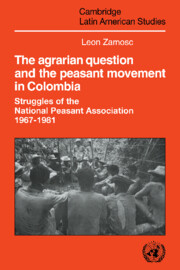 The Agrarian Question and the Peasant Movement in Colombia
The Agrarian Question and the Peasant Movement in Colombia Book contents
- Frontmatter
- Contents
- List of tables, figures, and maps
- Foreword by Tedor Shanin
- Foreword by UNRISD
- Acknowledgments
- List of abbreviations
- Map 1 Republic of Colombia
- Introduction
- 1 The agrarian question in Colombia
- 2 Reformism and the beginnings of the peasant movement
- 3 The radicalization of ANUC and the great waves of land invasions
- 4 Counterreform
- 5 The contradictory influences of peasant politicization
- 6 Concessions and repressive escalation
- 7 The new occupational alternatives and the issue of the rural proletariat
- 8 Partial repeasantization and the question of the new peasant settlements
- 9 Final crisis and clientelist regression of ANUC
- 10 Overview and final remarks
- Notes
- Bibliography
- Index
- Cambridge Latin American Studies
5 - The contradictory influences of peasant politicization
Published online by Cambridge University Press: 10 October 2009
- Frontmatter
- Contents
- List of tables, figures, and maps
- Foreword by Tedor Shanin
- Foreword by UNRISD
- Acknowledgments
- List of abbreviations
- Map 1 Republic of Colombia
- Introduction
- 1 The agrarian question in Colombia
- 2 Reformism and the beginnings of the peasant movement
- 3 The radicalization of ANUC and the great waves of land invasions
- 4 Counterreform
- 5 The contradictory influences of peasant politicization
- 6 Concessions and repressive escalation
- 7 The new occupational alternatives and the issue of the rural proletariat
- 8 Partial repeasantization and the question of the new peasant settlements
- 9 Final crisis and clientelist regression of ANUC
- 10 Overview and final remarks
- Notes
- Bibliography
- Index
- Cambridge Latin American Studies
Summary
The analysis of the land struggles and the review of developments within ANUC's National Junta have stressed the importance of leftist influences in the radicalization of the usuarios. After briefly considering the reorganizational tasks of ANUC Sincelejo due to the government's counteroffensive, the first section of this chapter will study the continued struggle for land during the remaining years of the Pastrana administration. The second section will examine the way in which leftist politicization, a central factor in the struggle, created internal contradictions that would have fateful consequences for the peasant movement.
Factors of continuity in the land struggles
The data on the land invasions of 1972 and 1973 clearly show their decline. Table 3.1 indicates that only 54 and 51 land occupations, respectively, occurred during these years, as against the 645 that had marked the extraordinary climax of 1971. Although the divisive and repressive measures of the Pastrana administration were key factors, they cannot completely account for this decline. Paradoxically, an equally important factor was the very success of the 1971 mobilizations. Most of the occupied lands had been taken over by INCORA and were now under negotiation, so that the de facto possession of the squatters was becoming seemingly irreversible as time went by and more and more improvements were made on the land.
- Type
- Chapter
- Information
- The Agrarian Question and the Peasant Movement in ColombiaStruggles of the National Peasant Association, 1967–1981, pp. 105 - 121Publisher: Cambridge University PressPrint publication year: 1986


